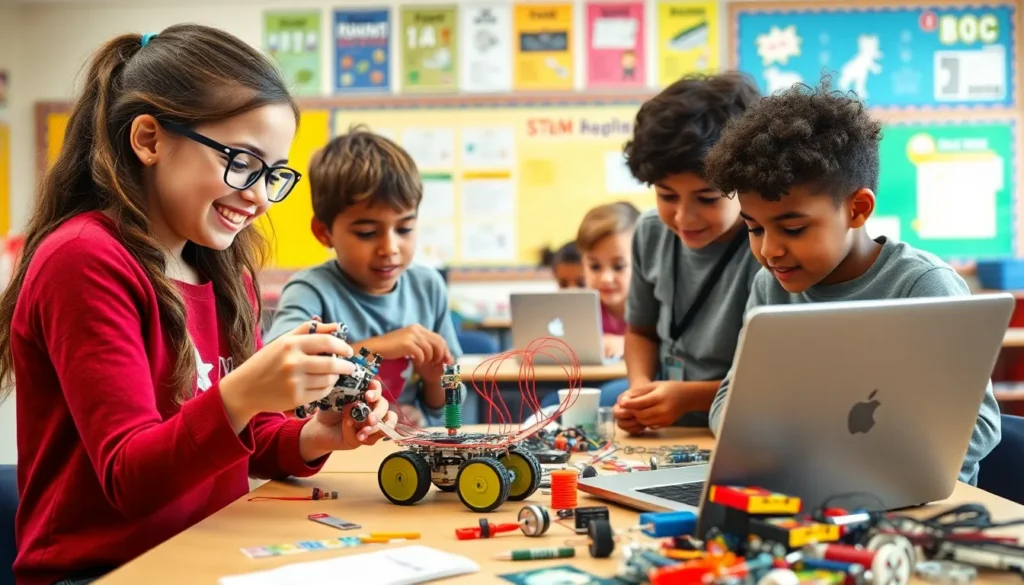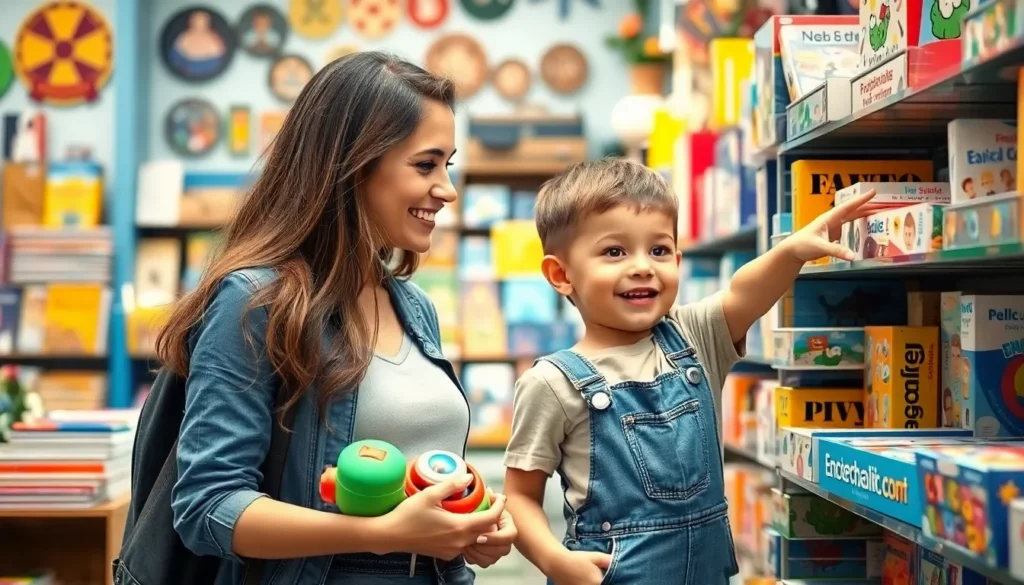Table of Contents
ToggleHomeschooling isn’t just a trend; it’s a revolution in education. With more families embracing this flexible learning style, the question isn’t whether to homeschool but how to do it right. From the structured approach of classical education to the free-spirited world of unschooling, there’s a flavor for everyone, even if that flavor is a little nutty.
Overview of Types Of Homeschooling
Various approaches to homeschooling cater to different educational philosophies and family preferences. Families often choose structured methods that incorporate specific curricula and standard teaching practices. This classical education model emphasizes foundational subjects, fostering an academic environment similar to traditional schools.
Some families prefer a more relaxed approach termed relaxed or eclectic homeschooling. This method blends various educational resources and styles, allowing parental flexibility to tailor education to children’s interests and learning speeds. With eclectic homeschooling, parents select materials based on their child’s needs, integrating resources such as online courses, community classes, and educational games.
Unschooling presents a distinct alternative. It focuses on child-led learning experiences rather than a fixed curriculum. This approach encourages children to explore their interests spontaneously. Parents facilitate by providing resources and opportunities for exploration, fostering independence and creativity.
Another popular model is project-based homeschooling. This method centers around completing in-depth projects that align with a child’s interests while covering multiple subjects in the process. Projects allow children to dive deep into subjects, enhancing critical thinking and problem-solving skills.
Lastly, hybrid homeschooling combines traditional schooling with homeschooling. Students may attend classes part-time in a traditional school setting while completing the rest of their studies at home. This approach offers social interaction alongside the flexibility of homeschooling, meeting varied educational needs.
These types of homeschooling reflect the versatility of the homeschooling movement, ensuring families can choose a method that resonates with their educational values and goals.
Traditional Homeschooling

Traditional homeschooling involves a structured approach where parents or guardians oversee their child’s education. This method closely resembles the conventional school system, incorporating specific curricula and schedules.
Curriculum Choices
Parents select curricula that align with their educational goals and their child’s learning preferences. Popular options include classical education, which emphasizes a rigorous focus on core subjects, and curricula based on state standards. Many families opt for pre-packaged educational resources that provide comprehensive lesson plans and assessments. Some use textbooks from established publishers, while others incorporate online courses for a modern twist. Curricula choices often reflect the family’s values and their desired academic rigor, ensuring a consistent education comparable to traditional schools.
Teaching Methods
Teaching methods in traditional homeschooling vary by family and student needs. Direct instruction remains a common technique, where parents deliver lessons similarly to classroom teachers. They may also utilize educational resources like worksheets and assessments to measure progress. Group learning can occur through co-ops, where families collaborate to teach specific subjects. Interactive tools, including educational games and online resources, enhance engagement. Parents frequently assess their child’s understanding through quizzes and feedback, adjusting methods as needed to support individual learning styles.
Online Homeschooling
Online homeschooling represents a modern approach to education, leveraging digital resources to facilitate learning. This method combines flexibility and accessibility, making it an appealing option for many families.
Benefits of Online Programs
Online programs offer numerous advantages for homeschooling families. Flexibility enhances the learning experience, allowing students to study at their own pace. Access to diverse resources broadens educational opportunities, catering to various learning styles. Moreover, interactive elements, such as videos and quizzes, engage students effectively. Parents benefit from structured curricula that guide lessons, streamlining the teaching process. Cost-effectiveness often accompanies online platforms, making quality education accessible to a wider audience. Overall, these programs foster independence and self-directed learning among students.
Popular Online Platforms
Several online platforms cater to the needs of homeschooling families. Khan Academy provides a vast array of free resources covering multiple subjects, promoting self-paced learning. Time4Learning combines engaging lessons with interactive activities, supporting various learning styles. The Well-Trained Mind Academy emphasizes classical education through structured courses designed for different grade levels. Outschool offers live classes in various subjects, allowing students to explore diverse interests. Finally, Acellus Academy delivers a comprehensive online curriculum, personalized to meet the needs of each student. These platforms illustrate the versatility and accessibility of online homeschooling options.
Unschooling
Unschooling emphasizes learner-directed education, prioritizing the interests and curiosities of children. This approach allows students to explore subjects that fascinate them, fostering a love for learning.
Philosophy Behind Unschooling
The philosophy of unschooling centers on the belief that children learn best through natural curiosity and exploration. Traditional curricula often impose structured learning, whereas unschooling trusts children to seek knowledge in ways that resonate with them. Advocates highlight the importance of experiential learning, where genuine interest drives education. This method encourages independence, enabling children to ask questions, seek solutions, and engage meaningfully with the world around them. Supporters argue that such freedom cultivates critical thinking and problem-solving skills necessary for life. Unschooling allows learners to take charge of their own education, creating personalized pathways that align with their passions.
Learning Through Life Experiences
Learning through life experiences forms the core of unschooling practices. Daily activities become valuable lessons not confined to textbooks or classrooms. For instance, cooking dinner enhances understanding of math through measurements, while gardening introduces biology concepts. Real-world interactions provide context for academic subjects, making learning engaging and relevant. Children can embark on field trips, volunteer opportunities, or apprenticeships, turning everyday moments into enriching educational experiences. Each child may pursue unique interests, ensuring education remains interesting and motivating. This hands-on approach equips learners with practical skills and knowledge applicable beyond formal education, preparing them for diverse future challenges.
Hybrid Homeschooling
Hybrid homeschooling integrates traditional schooling with home education. This approach allows families to create a personalized learning environment. Classes may occur in a regular school, while additional learning happens at home. Students benefit from the structure of traditional education and the flexibility of homeschool methods.
Combining Homeschooling With Traditional School
Families often choose a mixture of in-person classes and home-based learning activities. This combination enables parents to select specific subjects or experiences that suit their child’s needs. Schools may offer part-time enrollment options, allowing students to engage in extracurricular activities and group interactions. Parents supplement classroom learning with customized lessons at home. The blend fosters a balanced educational experience, merging the best aspects of both environments.
Advantages and Challenges
Numerous advantages accompany hybrid homeschooling. Flexibility remains a significant benefit, as families can adapt learning to individual schedules. Access to specialized resources is another advantage, allowing students to leverage community resources. However, challenges exist as well. Parents may face difficulties coordinating schedules between home and traditional school, which requires effective time management. Additionally, balancing different curricula can become complex, requiring attentiveness to ensure educational objectives are met.
The diverse types of homeschooling offer families a range of options tailored to their unique educational philosophies and children’s needs. Each method—from structured curricula to child-led learning—provides distinct benefits that can foster a love for learning.
As families navigate their homeschooling journey, they can select approaches that resonate with their values and lifestyles. This flexibility empowers parents to create enriching environments where children can thrive academically and personally. Embracing these various methods ensures that homeschooling remains a viable and effective alternative to traditional education, catering to the ever-evolving landscape of learning.







